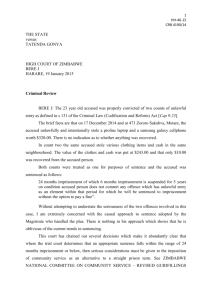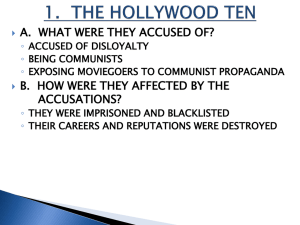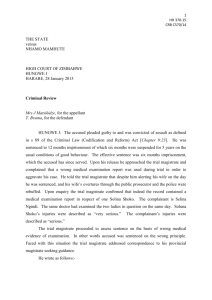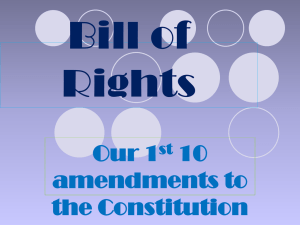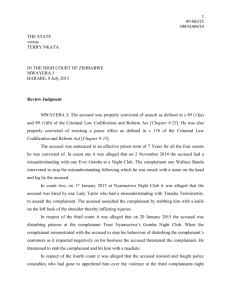HH 175-15
advertisement
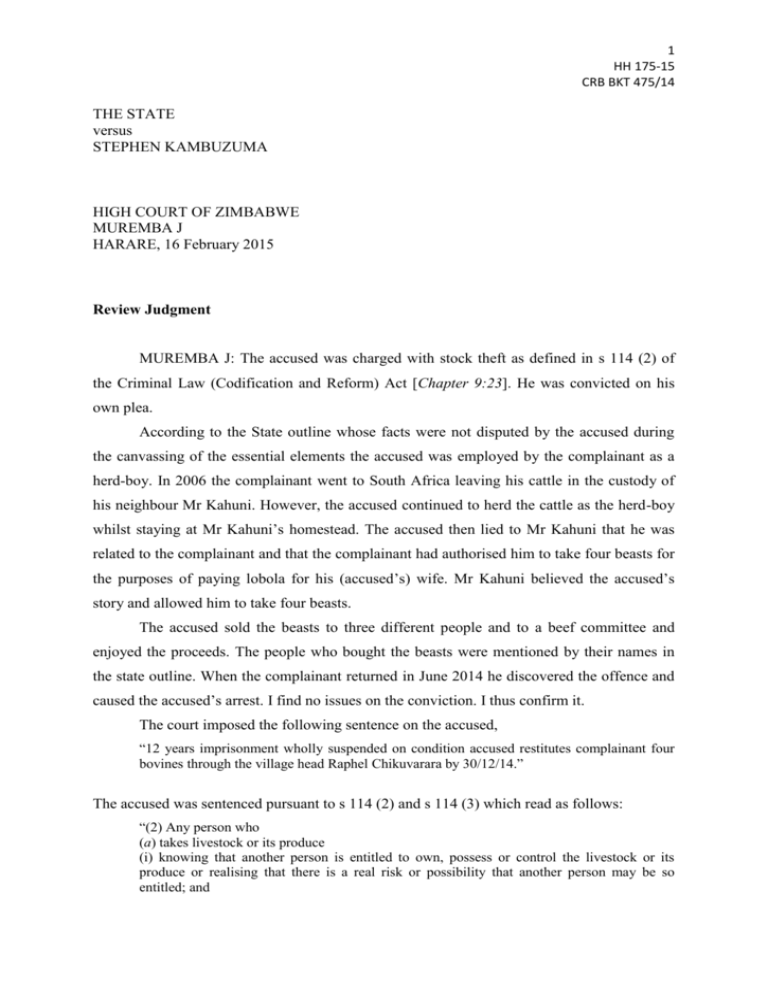
1 HH 175-15 CRB BKT 475/14 THE STATE versus STEPHEN KAMBUZUMA HIGH COURT OF ZIMBABWE MUREMBA J HARARE, 16 February 2015 Review Judgment MUREMBA J: The accused was charged with stock theft as defined in s 114 (2) of the Criminal Law (Codification and Reform) Act [Chapter 9:23]. He was convicted on his own plea. According to the State outline whose facts were not disputed by the accused during the canvassing of the essential elements the accused was employed by the complainant as a herd-boy. In 2006 the complainant went to South Africa leaving his cattle in the custody of his neighbour Mr Kahuni. However, the accused continued to herd the cattle as the herd-boy whilst staying at Mr Kahuni’s homestead. The accused then lied to Mr Kahuni that he was related to the complainant and that the complainant had authorised him to take four beasts for the purposes of paying lobola for his (accused’s) wife. Mr Kahuni believed the accused’s story and allowed him to take four beasts. The accused sold the beasts to three different people and to a beef committee and enjoyed the proceeds. The people who bought the beasts were mentioned by their names in the state outline. When the complainant returned in June 2014 he discovered the offence and caused the accused’s arrest. I find no issues on the conviction. I thus confirm it. The court imposed the following sentence on the accused, “12 years imprisonment wholly suspended on condition accused restitutes complainant four bovines through the village head Raphel Chikuvarara by 30/12/14.” The accused was sentenced pursuant to s 114 (2) and s 114 (3) which read as follows: “(2) Any person who (a) takes livestock or its produce (i) knowing that another person is entitled to own, possess or control the livestock or its produce or realising that there is a real risk or possibility that another person may be so entitled; and 2 HH 175-15 CRB BKT 475/14 (ii) intending to deprive the other person permanently of his or her ownership, possession or control, or realising that there is a real risk or possibility that he or she may so deprive the other person of his or her ownership, possession or control; or (b) takes possession of stolen livestock or its produce (i) knowing that it has been stolen; or (ii) realising that there is a real risk or possibility that it has been stolen; shall be guilty of stock theft and liable (c)………. (d)……….. (e) if the stock theft involved any bovine or equine animal stolen in the circumstances described in paragraph (a) or (b), and there are no special circumstances in the particular case as provided in subsection (3), to imprisonment for a period of not less than nine years or more than twenty-five years; or (f) if the stock theft was committed in the circumstances described in paragraph (a) or (b) but did not involve any bovine or equine animal, or was committed in the circumstances described in paragraph (c)or (d) (i) to a fine not exceeding level fourteen or twice the value of the stolen property, whichever is the greater; or (ii) to imprisonment for a period not exceeding twenty-five years; or both. (3) If a person convicted of stock theft involving any bovine or equine animal stolen in the circumstances described in paragraph (a) or (b) of subsection (2) satisfies the court that there are special circumstances peculiar to the case, which circumstances shall be recorded by the court, why the penalty provided under paragraph (e) of subsection (2) should not be imposed, the convicted person shall be liable to the penalty provided under paragraph (f) of subsection (2).” In short, in terms of s 114(2) (e) there is a mandatory sentence of between nine years and 25 years imprisonment if the stock theft involves cattle. A person can only escape the mandatory sentence if they can satisfy the court that there are special circumstances that are peculiar to the case, which circumstances should be recorded by the court. I would like to deal with two issues that surround the sentence that was imposed by the learned magistrate. The first relates to the way he canvassed the special circumstances and the second relates to the competence of the sentence that he imposed. The Canvassing of Special Circumstances The record shows that after convicting the accused, the learned magistrate clearly explained to the accused the meaning of special circumstances and that he risked going to prison for a period of not less than nine years and not more than 25 years if he failed to advance any special circumstances. When the accused was asked by the magistrate for special circumstances he advanced the following. He said that he sold about six or more of the complainant’s beasts. In other words he was saying that the number of beasts which were mentioned in the state outline was actually less than the number that he had actually stolen. He said that this was prompted by 3 HH 175-15 CRB BKT 475/14 the following reasons. Firstly, the cattle had no stock card and time and again the veterinary officer would threaten to impound the cattle. Secondly, there was a time he lost a brother and needed money for funeral expenses. Thirdly, at another time his wife had a miscarriage and since he needed money to foot the expenses he had to sell yet another beast. Fourthly, he averred that for all the years that the complainant was in South Africa he never did anything towards the upkeep of his cattle and payment of his salary. As the herd boy he was solely responsible for the upkeep of the cattle which included buying medicine for the cattle. The accused said that he had decided to sell the cattle and that upon the complainant’s return he was going to compensate him for all his beasts. The accused said that it was unfortunate that when the complainant returned and discovered the offence he rushed to the police without giving him a chance to explain himself. The accused stated that he had brought with him his father in law to court. He said that the father in law was willing to help him pay back the complainant’s four beasts. The father in law gave evidence under oath and confirmed to the court that he was willing to help compensate the complainant’s beasts so that his son in law would be spared a prison term. He said that he did not want to be burdened looking after the accused’s family while the accused was in prison as he had a large family of his own to look after. The father in law said that he had already spoken to the complainant about the issue of compensation and the complainant was agreeable to it. He said that all he needed was two weeks to compensate the complainant. He said that the complainant who was also in attendance at court could confirm the position. The court invited the complainant to comment on the matter. The complainant who also took the witness stand confirmed the arrangement with the accused’s father in law. He also confirmed that for the period that he was away in South Africa he did nothing towards the upkeep of his cattle. He also explained that he was not interested in the accused being sentenced to prison. All he wanted was to be compensated for his beasts. After the accused had made submissions on special circumstances and led evidence from his two witnesses the court went on to record mitigation from him. Thereafter, the court gave its reasons for sentence and then sentenced the accused. What I find flawed about the trial magistrate’s approach in canvassing the special circumstances is that firstly, he did not give the State an opportunity to respond to what the accused had submitted. The audi alteram partem rule was completely ignored as the court went on to make a ruling on special circumstances without hearing the State’s response on the issue. It is a procedural irregularity and a serious misdirection for the court not to ask the 4 HH 175-15 CRB BKT 475/14 State to make submissions and act is if the State has no role to play at all on the issue of special circumstances. Secondly, while the learned magistrate did the correct thing of allowing the accused to lead evidence from witnesses in line with s 70 (1) (h) of the Constitution of Zimbabwe Amendment Act (No.20) which states that any person accused of an offence has the right to adduce and challenge evidence, the procedural irregularity that he made was of not allowing the State to cross-examine those witnesses in order to ascertain the veracity of what they had said and what the accused had said. It is a rule of criminal procedure that if one party leads evidence from witnesses, the other party has a right to cross-examine those witnesses. What the accused and his witnesses said went unchallenged yet it is contradictory to what is contained in the state outline which contents the accused did not dispute when the essential elements were canvassed. In the state outline it is stated that the accused lied to Mr Kahuni that he was related to the complainant and that the complainant had authorised him to take four beasts for the purposes of paying lobola for his (accused’s) wife. Mr Kahuni is said to have allowed him to take the 4 beasts which beasts the accused then sold and squandered the proceeds. It is obvious that what the accused submitted on special circumstances is totally different from and irreconcilable with the contents of the state outline yet the learned magistrate allowed this to go unchallenged. As the accused was making his submissions, the court should have asked him to reconcile what he was submitting with the contents of the state outline, but this was not done. The court has a duty to ask the accused to explain any contradictions for it to be able to make an informed decision on the existence or otherwise of special circumstances. The court should not just accept submissions blindly. Thirdly, after the accused had finished addressing the court on special circumstances the magistrate went on to ask him to make submissions in mitigation. Thereafter the learned magistrate gave his reasons for sentence. It is in his reasons for sentence that he made a finding that there were special circumstances in the case justifying the non- imposition of the mandatory sentence. This is a procedural irregularity. The correct procedure is to canvass special circumstances just after the verdict, before mitigation. See S v Mbewe & Another 1988 (1) ZLR 7. In canvassing the special circumstances both the accused and the State should be given a chance to address the court. They can also lead evidence from witnesses if they so wish and if they do so, the other party has a right to cross examine the witnesses. Thereafter the court should give its ruling on the existence or otherwise of special 5 HH 175-15 CRB BKT 475/14 circumstances. In the case of S v Happy Simba Manase HH110/15 I dealt at length with this procedure. The Finding on Special Circumstances In view of the procedural irregularities highlighted above I was tempted to remit the case to the trial magistrate for him to canvass special circumstances afresh, but I have realised that despite the procedural irregularities I can ascertain from the contents of the record whether or not his findings on special circumstances were correct. So remitting the matter will not serve any purpose, but cause unnecessary delays in the finalisation of this case. As I have already stated above, for theft of a bovine, the accused can only be spared the mandatory sentence if he can show to the court that there are special circumstances peculiar to the case. The phrase ‘special circumstances peculiar to the case’ should be given a wide or broad interpretation so as to include circumstances that relate to the way the offence was committed and personal circumstances of the offender which should be special in nature. In R v DA Costa Silva 1956 92) SA 173 (SR) BEADLE J said, “There is, to my mind, some difference between ‘a circumstance of the case’ and ‘a circumstance of the offence’. The Court is here dealing with the quantum of punishment, and in making a decision on this I think that any fact which might legitimately be considered as an aggravating or mitigating feature of the case must be regarded as ‘a circumstance of the case’, even though it may not be ‘a circumstance of the offence’. An example might perhaps best illustrate this point. If a very elderly man who is suffering from some chronic disease which requires special diet and specialised medical treatment were convicted of driving a car whilst not insured against third party risks, and if it were shown that a sentence of imprisonment would be likely to cause his death, it seems to me that this would be a proper factor which the court could take into account in imposing a sentence of a fine instead of a sentence of imprisonment, although it would be a circumstance ‘special’ to the offender, and not ‘special to the offence’.” He went on to say, “I fail to see why in assessing punishment a circumstance which is special to the offender cannot be regarded as ‘a circumstance of the case’ simply because it is not related to the offence. It may well be that many circumstances of a case which relate only to the offender, and not to the offence, should not be taken into account; but this is because they would rightly be regarded as ‘general’, as opposed to ‘special’, circumstances.” It is also clear from the above case that special circumstances must not be general in character, but special and the record must support their existence. Quite a number of cases have examined what is meant by special circumstances. In the case of S v Vera 1976 (2) RLR 228 at 232 it was stated that these are circumstances which should be out of the ordinary 6 HH 175-15 CRB BKT 475/14 either in their degree or in their nature. It was further stated that the court should not accept all mitigating factors as constituting ‘special circumstances’ although every special circumstance will always be a mitigating factor. See also S v Telecel (Pvt) Ltd 2006 (1) ZLR 476 and S v Dumisani Sibanda HB103/2009. It is my conviction that had the legislature used the phrase ‘special circumstances peculiar to the offence’ instead of ‘special circumstances peculiar to the case’ a narrow interpretation restricted only to the way the offence was committed would be appropriate. I will now turn to deal with the circumstances of the present case. There are contradictions between the contents of the state outline and the submissions made by the accused as he addressed the court on special circumstances. Since the accused’s submissions were not challenged I will take it that he in a way disputed the contents of the state outline. So I will go by what he said. He said that when his brother died and when his wife had a miscarriage, he sold the complainant’s beasts in order to raise money to meet the necessary expenses. In a number of cases it has been mentioned that economic hardships do not constitute special circumstances as these are considered to be ordinary mitigating circumstances. See S v Martin Mugunzva and 2 others HB99/10. That the accused offered to compensate the complainant for his beasts and that the complainant accepted the offer and further indicated that he did not want the accused incarcerated does not stop the court from imposing the mandatory sentence. Again these are ordinary mitigatory circumstances. Even the argument that imprisonment would weigh heavily upon the accused‘s family including his father in law who would be burdened by looking after the accused’s family does not constitute a special circumstance. In R v DA Costa Silva 1956 92) SA 173 (SR) BEADLE J said, “The magistrate, in my view correctly, held that in the light of the purpose of the statute, the facts that the appellant had no previous convictions and that imprisonment would bear heavily upon him and his family, were insufficient to justify the suspension of imprisonment if a sentence of such imprisonment was required by law.” However, in S v Mugangavari 1984 (1) ZLR 80 (S) it was stated that mitigatory factors if considered cumulatively they can constitute special circumstances. In casu the accused faced financial challenges while he was looking after the complainant’s beasts for eight years and he was without a salary for that whole period. Having been convicted he offered to compensate the complainant his beasts. An extra ordinary thing about this case is the fact that the complainant was away in South Africa for eight years. He knew very well that he had left the accused whom he had 7 HH 175-15 CRB BKT 475/14 employed as a herd boy looking after his cattle, but for all those eight years he never sent money for the salary of the accused and for the upkeep of the cattle. Eight years is a very long time for anyone to survive without a salary if they are employed. Obviously the accused had family responsibilities and for him to deal with them he needed money. With his employer having gone away for years, the accused was put in the predicament of having to dispose of the complainant’s beasts whenever he faced financial challenges. All these factors considered cumulatively do constitute special circumstances. The Sentence Having made a finding that there were special circumstances in the case the learned magistrate ought not to have sentenced the accused to the mandatory sentence of between 9 years and 25 years imprisonment, but to a sentence under s 114 (2) (f). Other than that, the sentence that was passed is not a competent one. In terms of s 358 (2) (b) and s 358 (3) (b) of the Criminal Procedure and Evidence Act [Chapter 9:07] a court may pass sentence, but order the operation of it to be suspended on condition that the accused pays, “compensation for the damage or pecuniary loss caused by the offence.” Pecuniary loss means monetary loss. This therefore means that the compensation should be in monetary terms. In R v Kokerayi 1939 SR 237 it was stated that it is not competent to award compensation of cattle. In casu the learned magistrate awarded compensation of cattle. He had a prison term of 12 years suspended on condition that the accused delivered four herds of cattle to the complainant by 30 December 2014 through the village head. The most disappointing thing is that the learned magistrate who dealt with this matter is a provincial magistrate who by virtue of his rank is expected to be well versed with sentencing principles. Conclusion There is need to set aside the incompetent sentence that was imposed by the trial magistrate and substitute it with a competent one. I will impose a prison term which I will suspend wholly on condition the accused pays restitution to the complainant in monetary terms. The state outline states that the value of the four beasts is $2000-00. However, in the incompetent sentence the accused had been given until 30 December 2014 to deliver the four beasts to the complainant. In the event that he has delivered the beasts then there will not be any need for him to pay the $2000-00, but if he hasn’t by now 8 HH 175-15 CRB BKT 475/14 delivered the four beasts then he should not deliver them but pay $2000-00 to the complainant. The accused is sentenced as follows: “5 years imprisonment wholly suspended on condition he pays restitution to the complainant in the sum of $2000-00 through the clerk of court at Banket Magistrates Court.” MAWADZE J agrees………….



